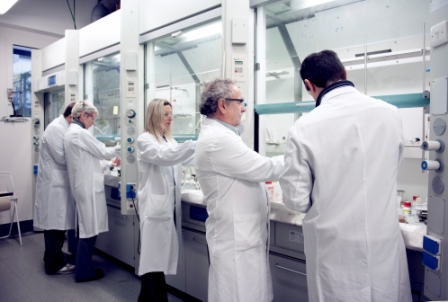 Nature Genetics has published a study that represented a fundamental step ahead in the improvement of drugs’ effectiveness for breast cancer treatment. The research has been performed at the European Institute of Oncology (EIO) by Saverio Minucci and Giancarlo Pruneri, both professors at the University of Milan –funded by the Italian Association for Cancer Research (AIRC) – in collaboration with the groups of Dr Luca Magnani (Imperial College, London) and Prof Antonino Neri (Policlinico Hospital and University of Milan). Researchers unraveled a genetic alteration responsible for drug resistance in hormone-responsive breast cancer, which represents two thirds of all breast tumor cases, and launched a molecular test to identify this mutation in patients.
Nature Genetics has published a study that represented a fundamental step ahead in the improvement of drugs’ effectiveness for breast cancer treatment. The research has been performed at the European Institute of Oncology (EIO) by Saverio Minucci and Giancarlo Pruneri, both professors at the University of Milan –funded by the Italian Association for Cancer Research (AIRC) – in collaboration with the groups of Dr Luca Magnani (Imperial College, London) and Prof Antonino Neri (Policlinico Hospital and University of Milan). Researchers unraveled a genetic alteration responsible for drug resistance in hormone-responsive breast cancer, which represents two thirds of all breast tumor cases, and launched a molecular test to identify this mutation in patients.
“One of the main issues in using anti-cancer drugs –state Dr Minucci and Dr Pruneri- is represented by the appearance of tumor cells resistant to treatment. Identifying cancer resistance mechanisms represents a key objective of anti-cancer research, as it will allow to face the disease by using resistance-specific new drugs, or clarifying the mode of use of existing drugs able to overcome resistance”.
In this paper, researchers focused on patients with hormone-responsive breast cancer, which is the most diffused breast tumor type, with about 35.000 new cases per year only in Italy. The main goal of the study was to identify molecular mechanisms of therapy resistance commonly occurring in these patients, based on inhibitors of aromatase (enzyme involved in the biosynthesis of estrogens, the hormones primarily responsible for the acquisition of female characteristics). The authors discovered that about 15% of breast tumors develop therapy resistance as a consequence of a specific genetic alteration that augments intracellular levels of the aromatase present in tumor cells, which is the target of these drugs.
This study has multiple clinical impacts, with an immediate effect on the choice of the most effective therapy. Through a test measuring variation in the copy number of the aromatase gene it will be possible to verify whether patients with hormone-responsive mammary tumor have developed this specific alteration. If so, it will be possible to evaluate alternative treatments, either already available or currently in experimental phase.
“The genetic test –the authors explain- is currently at a very early stage and is still not ready for being used as tool for routine diagnosis. It needs, indeed, to be enforced and standardized, through a process that we hope to accomplish with additional research funding”.
“This study –they conclude–further demonstrates that an integrated approach between clinical and basic research will allow a rapid translation of scientific results in clinical practice, with immediate effects on patients’ everyday life”.
This is a model strongly pursued both by EIO and University of Milan. EIO has been recently reorganized into multidisciplinary programs dedicated to integrated research and treatment of specific pathologies. Among those, the New Drugs Program, directed by prof Saverio Minucci, and the Senology Program, to which Dr Marco Colleoni, co-author of the study, belongs. Prof Pruneri and prof Neri are part of the first -recently created- exclusively oncological department (Department of Oncology, DIPO) of the University of Milan.